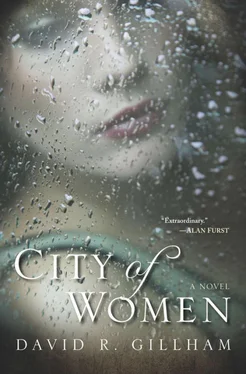Outside, under a hard white dome of light, she finds the blind man, beneath the clock. A passing rinse of afternoon rain, typical for Berlin, has turned the pavement into a slick mirror, throwing back a distorted reflection of the day.
“A coin in memory of our sacred dead?” the man rasps.
She can feel him gazing at her from behind the dark lenses of this goggles, and peers into their black reflection. “Yes. For the dead,” she agrees. Though as her coins ring in his cup, she bends her head toward his, as if to tell him a secret. “But I am working for the living now.”
WHAT WOULD ANY OF US DO?
Writing City of Women
This book came about from my desire to write about history and about ordinary people thrust into extraordinary circumstances.
I have always been captivated by history. Not just its broad sweep, but also its intimate corners, where the shadows gather. And Berlin, during the Second World War, was a city defined by its shadows. It provided the perfect setting for people making difficult decisions in their daily lives that could reshape their future in a heartbeat.
When I visited Berlin for the first time, just after the Wall came down in 1989, I intended to search for what was left of the city from before the war. What I discovered was that much of that city was gone. Just gone. Berlin’s busiest corner in the 1930s, the Potsdamer Platz, was nothing more than an open field studded by bits and pieces of shattered brick and tile. Its greatest rail palace, Anhalter Bahnhof, where Sigrid meets Ericha at the climax of the novel, was nothing more than a shattered remnant of its once grand façade. It sits, to this day, like a tombstone, at a subway stop that bears its name. And of the tunnel linking the station to the hotel across the street—that tunnel of shops through which Sigrid races with Ericha and the Weiss family, pursued by the Gestapo? The hotel is gone, the rail station is a ruined wall, but the tunnel is down there still, sealed beneath the streets. Inaccessible and forgotten. Through fiction, however, I found I could unearth it. I could resurrect the entire city, and the people in it. That’s where the characters of City of Women live. In the shadows of a lost city’s architecture.
So I travel in time. I close my eyes and open them in 1943. After a year’s hiatus, the British bombers return to Berlin. It is a shock. The Nazi regime has assured its people that the war is all but won. Just hang on for a little bit longer, they say. Make a few more sacrifices. Bury more of your sons and husbands, but don’t worry—victory is just around the corner. Yet by the time Sigrid returns to the bomb shelter in the cellar of Uhlandstrasse 11 at the beginning of the book, it is very difficult to ignore the fact that the war is not almost won. Not only is the RAF raining bombs on the rooftops again, but an entire German army has been annihilated in a place called Stalingrad, by an enemy who was supposed to be on the brink of utter defeat. And though no one dares voice the words, it is becoming apparent that Germany is losing the war. The Nazis try to distract the population from this bitter truth by intensifying their anti-Semitic campaigns. The Gestapo sweeps through Berlin’s factories, deporting Jewish workers and their families en masse: men, women, children, the elderly, the infirm, it makes no difference. They all go. And those who try to dodge arrest? Those who’ve found a place to hide? For them the Gestapo has dispatched the catchers of the infamous Search Service, Jewish inmates of the SS transit camp in the Grosse Hamburger Strasse, whose only job is to comb the city and track down other Jews—the so-called U-boats—who have submerged beneath the surface of the city’s daily life.
But what about those people who are not being arrested and deported? People who claim they are simply trying to feed their kids, keep a roof over their heads, and stay out of trouble? How do these people respond to the crimes being committed in their name by the regime? That is the question at the heart of City of Women . It’s about ordinary people making hard decisions in extraordinary times. It’s about small decisions leading to bigger decisions. And it asks, At what point does one arrive at a moral commitment? Sigrid Schröder helps a young woman whom she barely knows evade an arrogant police detective, simply because she doesn’t like bullies. A few months later Sigrid is being chased by the Gestapo through a train station, with the lives of four other people in her hands. How did she get there?
I created the character of Sigrid because I wanted to write about a woman who has capitulated to the slavish routine that defines her daily life. Her present has become so mind-numbing and tedious that she has given up on her own future. But when circumstances change, so does she. In fact, when Ericha Kohl seizes her arm in the cinema, and begs for her help, Sigrid is already primed to break free from her passivity by a passionate nature she has been taught since childhood to keep in check. Soon she is making one dangerous choice after the next, driven by… by what? Desire? Excitement? Conscience? All of these? Certainly, she has watched as the casual anti-Semitism of the German middle class in the 1930s has transformed into state-sponsored persecution, and state-supported pogroms. She has witnessed the Night of Broken Glass in Berlin, and its aftermath, when thousands of Jews were arrested, beaten, and murdered. For years she may have disapproved, she may have felt shame for her nation, but she did not resist, even as Jewish Berliners were marched through the streets on their way to “resettlement” in the East. Did she feel helpless to act? Most probably. (What, after all, could one woman do?) Did she feel relieved by the fact of her helplessness? Very likely. If she could not act, then she did not need to feel a responsibility to act. So when she finally breaks free of this self-imposed trap, how much of Sigrid’s transformation is due to love or moral choice, and how much is due simply to her sudden need to recognize her true self?
Of course, the overarching question—the question I continually asked myself as I was writing City of Women —was and is: What would you do? It’s easy to watch from a comfortable distance as people make choices with life-or-death consequences. Characters in a book make their decisions and roll the dice. They succeed or fail, they live or die. But the question is: If you were Sigrid, and a young woman seized you by the arm as you sat in a cinema, and begged, Please say that we came here together, what would you do? What would any of us do?
—
David Gillham
There are a number of people whose guidance, support, and rallying spirit were instrumental in bringing City of Women to fruition.
First, I want to offer thanks to my agent, Rebecca Gradinger of Fletcher and Company, who has labored ceaselessly on my behalf, and has the ability to routinely make the impossible possible. I can count on her encouragement when the work is on track, and, more importantly, her unflinching critical eye when it’s not. I also want to thank Christy Fletcher, who maintained her faith in my work for over ten years, and was willing to give me the break I needed when I finally had the material that could crack a long cycle of glowing rejections.
Then there’s my editor and publisher, Amy Einhorn. I could not have imagined a better fit or a more generous and supportive editor had I made her up myself. Fortunately, I didn’t have to. Amy is brilliantly meticulous in her work (she still does a complete line edit) and both my characters and I owe her a deep debt of gratitude. Thank you, Amy.
Читать дальше












